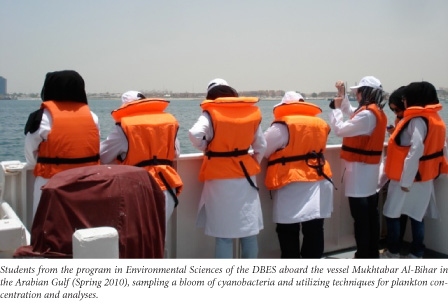Environmental Challenges for the Countries of the GCC
A primary indicator of the robustness of a country’s economy is the gross domestic product (GDP), which is essentially the total dollar value of all goods and services. In this respect, Qatar is recognized as the richest nation in the world,[1] with an unprecedented projected expansion in its GDP, notable during these troubled economic times, of 18.5% for 2010.[2] Oil and gas have made Qatar the second highest per capita income country, following Liechtenstein.[3] Such wealth does not come without problems, however, and like other countries in the Gulf region, Qatar is faced with a plethora of environmental challenges.
There is an expansive literature on environmental issues, urban growth, and pollution in the countries of the Gulf Cooperation Council (GCC) and an awareness that environmental pollution, degradation, and lack of resource management at the national and regional levels are priority issues of concern. Since the majority of the population lives in the coastal zone, the important issues are air quality, sewage and waste water management, garbage disposal, degradation of the near shore marine environment, land reclamation, provision of adequate electricity and potable water, conservation of natural resources, and all of the inherent social consequences. These issues were the focus of a most informative international congress hosted by the Environmental Center for Arab Towns (“Challenges and Threats to the Environment - Lessons from the Past to Shape the Future”) that the author attended in Dubai in 2006.[4]
In the past several years, international agencies have commented in depth on the underlying problems, which aggravate environmental issues in the Gulf region. The comments include:
There is a persistent shortage of environmental specialists in the ESCWA (Economic and Social Commission for Western Asia) region. The existing environmental agencies need to further develop their capacities to tackle environmental challenges on a trans-boundary scale. At present, any attempts to improve environmental standards are held back by the lack of skilled manpower and technological expertise.[5]
The region lacks the capacity to manage hazardous waste safely: it lacks appropriate storage and disposal facilities; it lacks the requisite skills to evaluate risks and monitor controlled dumping or recycling; and it lacks, as yet, the capacity to undertake detection, remediation or possible treatment.[6]
A joint regional body of experts and representatives of Governments, non-governmental organizations, and regional and international organizations is needed.[7]
Advancing Sustainable Development — Qatar National Vision 2030
The Qatar General Secretariat for Developmental Planning recently published the report “Advancing Sustainable Development — Qatar National Vision 2030” (QNV 2030), a decisive study.[8] The key conclusions and recommendations of QNV 2030 emphasize the overwhelming importance of the environment as one of four pillars for sustainable development in Qatar. Key recommendations/observations include:
“A critical challenge is to combine economic progress with sustainable environmental policies.”
“The QNV 2030 commits to maintaining harmony between economic growth, social development and environmental management in building a bright future for the people of Qatar.”
“Innovative desalination technologies that minimize both cost of water production and the environmental impact should be further investigated.”
“Threats to the health, productivity and biodiversity of the marine environment result largely from human activities.”
“Qatar needs to continue to build its scientific and technical capacity through investments in people, research institutions and its overall science and technology context.”
“Build national capacity for developing, implementing, monitoring and evaluating environment-related policies and programs.”
The report emphasizes the clear need for a spectrum of qualified workers in the environmental field, from research scientists (research experience) to workers in regulatory positions (professional experience). Furthermore, the QNV 2030 report identifies three of Qatar’s environmental stress points, namely water security, threats to the marine environment, and climate change, which are driven largely by human activities. There is a compelling need to manage environmental problems in an ecologically- and environmentally-compatible manner, and this is of especial relevance with regard to the marine environment and its resources (fisheries, recreational, etc).
Research and Teaching in Environmental Science at Qatar University - BSc and MSc
The education of youth is of critical importance in this region. The BSc in Environmental Science at Qatar University was designed as a degree program of four years, with 125 credit hours of study and options for specialization in either Marine Science or Biotechnology. The program, with its home in the Department of Biological and Environmental Sciences (DBES) was opened in 2008 and, currently, there are more than 30 students enrolled in the program. Of this student body, it is clear that many have elected to continue their graduate studies and to complete the degree of MSc (see below) in the DBES. The BSc curriculum is an eclectic one since it draws on courses and faculty from contributing departments in the colleges of Arts and Sciences, Engineering, and Law. An important aspect of the program is a summer internship with a stakeholder, as well as a research experience (Figure 1). The specific objective of the BSc in Environmental Science is to provide undergraduate education and research in the broad field of environmental sciences to address the needs of Qatari society, particularly the workforce needs of stakeholders. The program seeks to educate students in current concepts, research, technological advances, and underlying scientific principles in the study of: marine and desert ecosystems; management and conservation of natural resources; urban and regional planning; needs of society and social consequences of urban and industrial growth; resource management (especially water); waste management; and environmental laws, regulations and environmental science policy as they pertain to the GCC in general, and specifically to the State of Qatar.
The DBES is currently pursuing accreditation for the BSc program with the Committee for the Heads of Environmental Sciences (CHES) through the Institution for Environmental Science (IES), in the United Kingdom. Accreditation of the MSc program (see below) will also be pursued through this agency.
The recently designed MSc in Environmental Science in the DBES involves two years of study (34 credits of coursework) and the option to complete either two semesters of focused research for submission of a MSc thesis or an internship with a stakeholder and submission of a technical report. The program will be opened to full-time and part-time students in Fall 2011. For the MSc program we focused on the development of foundation (core) courses and electives of particular relevance to the needs in Qatar, and designed the curriculum in the context of the Benchmark Statement for Environmental Sciences of the Quality Assurance Agency (QAA) of the United Kingdom. The MSc curriculum incorporates a graduate seminar (based on the format of the freshman seminar in the BSc program), lectures, group projects, tutorials, laboratory critical thinking, intensive writing, problem solving through research, field internships, and independent research.
In addition to these recent developments, from Fall 2000 to Fall 2010, some 100 undergraduate research projects were completed in the DBES (enrollment in the BSc in Biology and BSc in Environmental Science programs). In fact, the majority of these projects were (are) focused on topics in environmental science including: biodiversity, remediation, environmental health, toxicology, etc. These projects contributed to the development of the research and teaching infrastructure for the study of environmental science at Qatar University.
The DBES established “Biology Field” in the grounds of Qatar University to both conserve and protect the natural biodiversity of animals and plants there, and to serve as a resource for students enrolled in the degree programs of the DBES. Another venue for teaching and research is the University Farm, administered by the DBES, in the north of Qatar.
The Environmental Studies Center at Qatar University
A number of the faculty in the DBES are affiliated with The Environmental Studies Center at Qatar University (http://www.qu.edu.qa/offices/research/esc/). The ESC is one of the oldest research centers in the Gulf region. Since its establishment in 1980, under the name of SARC, the Center has established its credibility as a lead institution for marine science in the region. The mandate of the ESC is protection of the natural heritage of Qatar. The ESC provides comprehensive facilities and opportunities for continued training and research in all aspects of environmental science, including environmental impact assessments within the country.
Further opportunities for research and education include the ESC’s current ocean-going vessel, the Mukhtabar Al-Bihar, which is an effective mobile laboratory serving different branches of marine science. It is used to perform various types of projects in different marine research areas such as fisheries, marine biology, and physical, chemical, and geological oceanography (Figure 1). Very recently, a delegation from QU attended the ground-breaking ceremony for the keel laying of the national research vessel Janan, named after the island located in the western part of the Qatari peninsula.[9] The Janan will provide state-of-the-art facilities for faculty, technical staff, and students, including a sewage treatment unit, water desalination plant, an ER for medical emergencies, and a diving room.
Research and Education in Environmental Science and Sustainability in Qatar
Qatar National Research Fund has the mandate to support undergraduate and graduate education in Qatar. New infrastructure includes the development of Education City and the Qatar Science and Technology Park. Flagship programs include the National Priorities Research Program (NPRP) as well as the Undergraduate Research Experience Program (UREP); both of these programs are of relevance to the study of environmental sciences in Qatar. In the DBES, one NPRP-funded program entitled “A Middle East Research Consortium” supports collaboration between our department and the Centre for Biotechnology (CBS) in Sfax, Tunisia. CBS has extensive and well-established MSc and PhD programs that allowed in the past three years, and continue to allow, reciprocal exchanges of students, technicians, and faculty between CBS and the DBES. In addition, one UREP grant, as well as internal support from QU, made it possible to establish the Qatar University Culture Collection of Cyanobacteria and Microalgae (QUCCCM) representing biodiversity from the broad range of environments in Qatar. QUCCCM serves as a research and teaching resource for students and faculty.
Sustainability of Qatar
In the past decade, Qatar underwent unprecedented expansion in the development of industries from its gas and oil reserves. In fact, this expansion continues unabated despite a world recession. The QNV 2030 vision, recognition of the need to protect Qatar’s natural reserves for future generations, collaboration on environmental issues with partners in the GCC, and the remarkable ongoing investment in higher education, constitute a paradigm - one that instills considerable optimism for the future of this small yet dynamic country and its efforts to bring positive change to the region.
[1]. “The World’s Richest and Poorest Countries,” http://www.gfmag.com/tools/global-database/economic-data/10299-the-worl….
[2]. “Qatar’s GDP Growth Seen at 16% 2010–11,” http://www.ameinfo.com/227843.html.
[3]. “Qatar Economy 2011,” http://www.theodora.com/wfbcurrent/qatar/qatar_economy.html.
[4]. “Sama Dubai Supports Launch of Environmental Center for Arab Towns,” http://www.ameinfo.com/102992.html.
[5]. PriceWaterhouseCoopers issued the following document under Framework Contract EC TRADE 02-F3-03: “Sustainability Impact Assessment (SIA) of the Negotiations of the Trade Agreement Between the European Community and the Countries of the Cooperation Council for the Arab States of the Gulf (GCC)” (2004).
[6]. The Supreme Council for the Environment and Natural Reserves of Qatar, “National Biodiversity Strategy and Action Plan” (2004). This document, in adherence to the Convention on Biological Diversity, encompassed recommendations from the Scientific and Applied Research Center (SARC), Government Ministries, and other institutions and consultants.
[7]. The Economic and Social Commission for Western Asia (ESCWA) issued a document in 2005 through the United Nations (E/ESCWA/SDPD/2005/5 July) that summarized the State of the Environment in the Gulf Region conference and its recommendations.
[8]. The Qatar General Secretariat for Developmental Planning, “Advancing Sustainable Development-Qatar National Vision 2030,” Second National Human Development Report (2009).
[9]. “QU Delegation Attend Groundbreaking Ceremony in Spain,” http://www.qu.edu.qa/newsletters/campuslife/article.php?id=2047
The Middle East Institute (MEI) is an independent, non-partisan, non-for-profit, educational organization. It does not engage in advocacy and its scholars’ opinions are their own. MEI welcomes financial donations, but retains sole editorial control over its work and its publications reflect only the authors’ views. For a listing of MEI donors, please click here.













